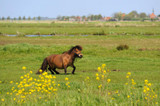 Caring for a horse requires a lot of
time and consistency. There are things and procedures that must be completed
daily, weekly, semi-weekly and so on. Hence, when people make an impulsive
decision to get an equine, most of the time it is not weighed out and thought through.
Caring for a horse requires a lot of
time and consistency. There are things and procedures that must be completed
daily, weekly, semi-weekly and so on. Hence, when people make an impulsive
decision to get an equine, most of the time it is not weighed out and thought through.
Among all the equines, pony horses are the most adorable, cute looking creatures that seem to be the best fit as a new pet. The truth is that this breed of horses requires greater attention and care if compared to any other equine.
Having a pony is not just an expensive investment, but also a time consuming obligation.
If you are thinking of getting a pony or already have one, then you must put their needs on high priority. Review our tips and suggestions about the routine care all pony horses require.
Pony Horse Food Needs
The food your pony consumes has to be clean. This is the reason why it is suggested to keep the food on a rack or in a bucket, rather than spilling it onto the ground. Pony horses should never consume food that is mixed with dirt.
Their diet should contain high amount of quality grass hay. They will require slow introduction to pasture due to high risk of overfeeding and associated with it obesity. Sparse grass would be ideal for ponies.
If you are planning to use your pony for public riding or private lessons several times a day, make sure you add grains, concentrates, as well as a equine probiotic and equine supplements to maintain healthy digestion and weight balance.
Worm Protection
To maintain good digestion, you will require to do regular de-worming. In the event you suspect your pony is contaminated with internal parasites, it is crucial to act fast and contact a veterinarian as soon as possible.
Ponies can suffer chronic illnesses, which will also have an impact on their daily functioning. Worms and parasites cause severe health consequences such as gut perforation, colic, blockages, and more serious internal and intestinal damages.
Vaccination
Weekly checkups and regular vaccinations are essential to ensure your pony is healthy internally and externally. Just like humans, pony requires injections against tetanus which is prescribed by a veterinarian. This should be done right after you buy your horse.
Also, you shall enquire about their last tetanus shot from a previous owner to sync the dates. If the horse does not get the tetanus shot exactly when it’s due to have one, any wound that may occur unnoticed during that time, can lead to serious infections. These infections are contagious and can cause very serious health issues for you and the riders.
Protecting from Other Animals
Since pony horses are short and are raised as pets, they require protection from other animals. It is significant to have a square wire mesh fence surrounding the paddock. This will ensure your pony’s safety from stray dogs or any other stray or wild animals that could cause harm to your pet.
Hooves and Fur Cleaning
If the hooves of the pony are not trimmed properly, it will end up hurting itself. For that reason, cleaning and trimming the hooves is very important. Ensure that your pony does not feel any discomfort, swelling, or have difficulties walking by taking good care of its hooves and legs.
Proper Diet
Pony horses tend to gain weight easily and can become obese very fast. The cause for their rapid weight gain is their short height and slow speed. If the pony is not used for riding, then it does not need a lot of food.
This is the reason why it is essential to monitor their food intake and provide them with small amounts of food several times a day. This will also help your pony digest the food you give it.
Lastly, just as a full size horse, your pony needs regular grooming and brushing. Pay attention to their skin and coat, and, for better results, use specially formulated quality products and specific equine sprays.
You will be required to check pony’s teeth as well. This is because their teeth have tendency to outgrow very fast.
Pay close attention to that too.
Before making a final decision whether to get a pony horse or not, we suggest you to consult a veterinarian and inquire about routine medical exams and any medications it may need. Also, it is suggested to keep a diary or calendar to record any changes your pony may undergo.
All these will help you stay upbeat with the routine equine care and keep your pony in a good health. It will increase its lifespan and productivity as well.


